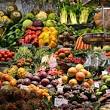Economists at the Centre for the Study of the Economies of Africa (CSEA), a leading economic research and consulting services firm with focus on emerging developments in African economies, have charged the Federal Government to commit more investments to farmer assistance programmes in order to address the surging average Cost of a Healthy Diet (CoHD) in the country.
The experts, in the firm’s ‘Nigeria Economic Update Issue 25’ circulated to our correspondent, recalled that in the recently published CoHD report by the National Bureau of Statistics (NBS) the agency reported that the national average cost of a healthy diet (CoHD) for May 2024 rose to N1,041 per day, up 0.6% from N1,035 the previous month.
The CoHD is the least expensive combination of locally accessible food items that match global consistent food-based dietary and nutritional recommendations, implying that an average Nigerian spends N1,041 per day to maintain a balanced diet.
According to the statistics agency, on a regional basis, the South-East region had the highest cost per adult per day, at N1,189, compared to N919 in the North-West region.
Similarly, the report indicated that at the state level, Ebonyi, Abia, and Anambra had the highest expenses (N1,225, N1,215, and N1,205, respectively), while Yobe, Jigawa, and Kano had the lowest costs (N907, N899, and N898).
The CSEA researchers noted that these variances showed the differences between states in agricultural output, product availability, and market prices and that the CoHD had been rising consistently alongside general and food inflation, with starchy staples, legumes, nuts, and seeds driving the increase.
On options open to the Federal Government to mitigate the rising healthy diet costs in the country, the analysts advocated: “To combat the upward movement in CoHD, the government should increase investment in agriculture through farmer assistance programmes.
“These initiatives would boost domestic food production, which in turn, is expected to reduce the price of food items and increase households’ access to nutritious food”, they added.






